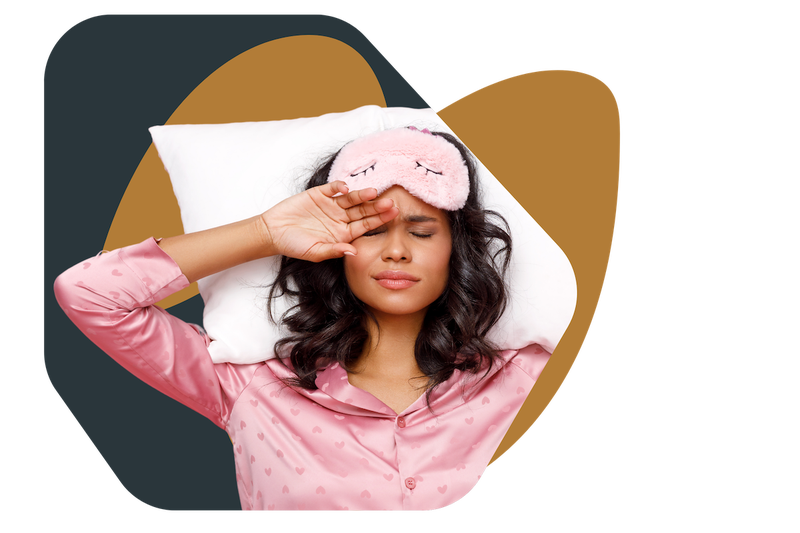Sleep difficulties
Alongside our experienced therapists, develop personalised strategies to improve the quality of your sleep, and learn different relaxation techniques to embed in your daily routine and help switch off your busy mind.
Potential factors in sleep problems

How can sleep therapy benefit you?
If you have ongoing issues with your sleep, seeking guidance from a psychologist trained to offer sleep therapy or relaxation therapy techniques can be very beneficial. They can help identify the factors contributing to your sleep issues, develop a plan, and teach you key skills to help improve the quality and duration of your sleep.
They will typically focus on relaxation or soothing strategies to help get you and your environment set up for optimal sleep, but also the cognitive component – addressing the way you think or respond to issues with your sleep habits.
CBT-I
Sleep hygiene
Solution focused therapy
Available psychologists who can help with sleep difficulties
The benefits of improving your sleep habits
Sleep is important for various functions in our bodies, assisting across both physical and emotional levels:
- Repair: our body restores itself when we sleep by repairing muscle, tissue or damaged cells.
- Consolidates memories: we enhance our learning and cognitive function when we can retain new information. When we sleep, our brain consolidates the things we learned that day, processing new information and retaining it.
- Regulate our hormones: sleep helps us regulate hormones associated with; metabolism, appetite and stress. When we have enough good quality sleep it helps balance our hormone levels, and in turn this optimises the functioning of various systems in our body.
- Immune functionality: sleep helps promote the production of proteins and immune cells that help us ward off disease and infection. Sleep helps promote a strong immune system and in turn a reduced risk of becoming ill.
- Emotional regulation: when we sleep, our brain works through and processes emotional experiences we had during the day. Sleep helps us feel more able to cope with challenges, regulate our emotions and reduce our stress levels.
What happens if I don't get enough sleep?
Not getting enough sleep can have significant consequences for your physical health, mental well-being, cognitive function, and overall quality of life.
- Impaired cognitive function: Sleep is crucial for cognitive processes such as attention, concentration, memory, and decision-making. Chronic sleep deprivation can impair cognitive function, leading to decreased alertness, slower reaction times, poor judgment, and difficulty learning and retaining information.
- Mood changes: Lack of sleep can negatively impact mood regulation, increasing the risk of irritability, mood swings, anxiety, depression, and emotional instability. Chronic sleep deprivation is associated with higher rates of mood disorders and may exacerbate existing mental health conditions.
- Weakened immune function: Adequate sleep is essential for a healthy immune system. Chronic sleep deprivation can compromise immune function, making you more susceptible to infections, illnesses, and prolonged recovery times. It is also linked to an increased risk of various chronic health conditions, including obesity, type 2 diabetes, cardiovascular disease, hypertension, and metabolic syndrome. Poor sleep can disrupt hormonal balance, appetite regulation, and metabolism, contributing to these health problems.
- Impaired physical performance: Sleep is essential for physical recovery, muscle repair, and optimal athletic performance. Lack of sleep can lead to decreased physical endurance, coordination, and strength, increasing the risk of accidents, injuries, and impaired athletic performance.
- Poor stress management: Sleep plays a vital role in stress regulation and resilience. Chronic sleep deprivation can increase stress hormone levels (e.g. cortisol) and decrease stress tolerance, exacerbate feelings of stress, overwhelm, and burnout.
- Impaired social functioning: Sleep deprivation can impair social and interpersonal functioning, affecting communication skills, empathy, and interpersonal relationships. Chronic sleep loss may lead to irritability, conflicts, and social withdrawal, straining relationships with family, friends, and colleagues.
- Increased risk of accidents: Sleep deprivation significantly increases the risk of accidents and injuries, both on the road and in the workplace. Drowsy driving, impaired judgment, and decreased reaction times due to lack of sleep can lead to serious accidents and fatalities.
- Decreased quality of life: Chronic sleep deprivation can negatively impact overall quality of life, reducing enjoyment, satisfaction, and fulfilment in daily activities. Persistent fatigue, mood disturbances, and physical health problems associated with poor sleep can diminish your overall well-being.
- Shortened lifespan: Long-term sleep deprivation is associated with an increased risk of mortality and a shortened lifespan. Chronic sleep disturbances are linked to higher rates of mortality from various causes, including cardiovascular disease, metabolic disorders, and accidents.
Prioritising adequate sleep is essential for maintaining optimal physical and mental health, improving cognitive function, enhancing mood and well-being, and promoting longevity and overall quality of life. If you're experiencing persistent sleep difficulties, it's important to seek guidance to identify underlying causes and explore appropriate interventions to improve sleep quality and quantity.
How can I fix my sleep hygiene?
Improving sleep hygiene involves adopting habits and practices that promote better sleep quality and quantity. It may take some time to see improvements, so be patient and consistent in implementing these habits.
- Have a consistent sleep schedule: Go to bed and wake up at the same time every day, even on weekends. Consistency helps regulate your body's internal clock and promotes better sleep-wake cycles.
- Create a relaxing bedtime routine: Establish a relaxing pre-sleep routine to signal to your body that it's time to wind down. This might include activities such as reading, taking a warm bath, practicing relaxation techniques (e.g. deep breathing or meditation), or listening to calming music.
- Create a comfortable sleep environment: Make sure your bedroom is conducive to sleep by keeping it cool, dark, and quiet. Invest in a comfortable mattress and pillows, and remove any distractions (e.g., electronic devices, excess clutter) that may disrupt your sleep.
- Limit exposure to screens before ed: Minimise exposure to screens (e.g. smartphones, computers, TVs) at least an hour before bedtime, as the blue light emitted by screens can interfere with the production of melatonin, a hormone that regulates sleep-wake cycles.
- Watch your diet: Avoid heavy meals, caffeine, and alcohol close to bedtime, as these can disrupt sleep. Instead, opt for light, nutritious snacks if you're hungry before bed, and limit fluid intake to prevent waking up frequently to use the bathroom.
- Get regular exercise: Engage in regular physical activity during the day, but avoid vigorous exercise close to bedtime, as it can be stimulating and interfere with sleep. Aim for moderate-intensity exercise earlier in the day to promote better sleep quality.
- Manage stress and anxiety: Practice stress-reduction techniques such as mindfulness meditation, progressive muscle relaxation, or journaling to help calm your mind and prepare for sleep. If worries or racing thoughts keep you up at night, consider scheduling a designated worry time earlier in the day to address concerns.
- Limit naps: While short naps can be beneficial for some people, excessive daytime napping can disrupt nighttime sleep patterns. If you need to nap, aim for a short nap (20-30 minutes) early in the afternoon to avoid interfering with nighttime sleep.
- Establish sleep-friendly habits: Reserve your bed for sleep only. Avoid using electronic devices, working, or watching TV in bed, as these activities can associate your bed with wakefulness rather than sleep.
- Seek professional help if needed: If you've tried improving your sleep hygiene but continue to experience persistent sleep difficulties, consider seeking guidance from a healthcare professional or sleep specialist. They can help identify underlying factors contributing to your sleep problems and recommend appropriate interventions or treatments.
What clients say about My Mirror
Ease of access
Very easy to use the dashboard and excellent to read the bio's of each Psychologist to determine best fit. Very happy with service and support.
Such a great service
I have been nothing but impressed and grateful for My Mirror and my psychologist. The way that they put me in touch with the right person make me feel grateful and the user interface / booking system is nice and easy. Very satisfied and would recommend to others.
Customer experience
Everyone in the team from my psychologist and the customer support team is so supportive and understanding. They act really quickly and get you what you need whilst being lovely people to deal with! 10/10 recommendation.
Great Selection
Great selection that allows you to find the perfect fit for your needs. I found my perfect match first time . This is a very easy platform to use and working online makes it so comfortable to talk. Definitely give it a try, just make sure you read the profile so get a good fit.

